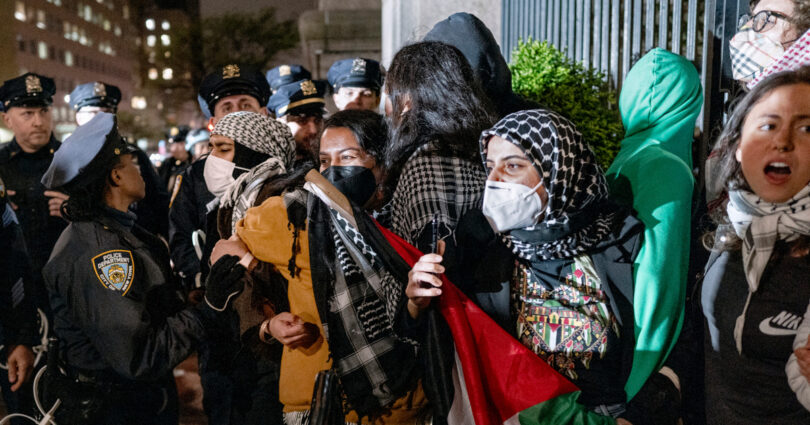A federal judge ruled Tuesday that a Columbia University student who took part in campus protests against Israel’s military offensive in Gaza cannot be detained as she fights orders for her deportation.
Lawyers for Yunseo Chung, a 21-year-old permanent U.S. resident, say their client was a victim of « shocking overreach » by the government, which is seeking to deport her because of her political views and constitutionally protected protest activities.
The attorneys filed a lawsuit Monday seeking to stop the deportation and the « pattern and practice of targeting individuals associated with protests for Palestinian rights for immigration enforcement, » adding that Chung’s detainment came around the time Columbia graduate student Mahmoud Khalil was arrested this month.
« The government’s actions are an unprecedented and unjustifiable assault on First Amendment and other rights, one that cannot stand basic legal scrutiny, » the lawsuit says.
U.S. District Judge Naomi Reice Buchwald on Tuesday granted a temporary restraining order against the government preventing Chung from being detained in her immigration case, according to the court order.
Buchwald said at the hearing that the government had not provided enough evidence to support its claims, The Associated Press reported.
Attorney Ramzi Kassem, a member of Chung’s legal team, told reporters outside the court that the ruling was « the just and fair thing. » He described the government’s actions as « outrageous »
« The court did the sensible thing — it is a temporary restraining order, » Kassem said. « Until further order of the court, ICE will not be able to take further steps to detain her, and we will continue to fight as hard as we need to to vindicate her constitutional rights in court. »
Originally from South Korea, Chung and her family have lived in the United States since she was 7 years old. The lawsuit says immigration officials signed an administrative arrest warrant for Chung on March 8, the day Khalil was arrested. Like Khalil, she does not need a student visa because of her permanent resident status.
However, unlike Khalil, Chung was not arrested or detained by immigration officials, and her lawyers are seeking to ensure it remains that way.
Joshua Colangelo-Bryan of Human Rights First, one of the groups legally representing her, said Tuesday that federal officers had simply not managed to find Chung to carry out a warrant for her arrest.
« The government has been very clear that it intends to expel people who have green cards if they express ideas, particularly relating to Gaza, that it doesn’t agree with, » he said.
Colangelo-Bryan said he was not aware of other students with green cards who were in that situation but added, « I would not be remotely surprised if we find out that there are other people being targeted by the government, even though they’ve done nothing except voice concern about civilians being killed. »
The suit names President Donald Trump and other Cabinet members as defendants, as well as acting ICE Director Todd M. Lyons and acting ICE New York Field Office Director William P. Joyce. It accused the government of using the threat of deportation as « a tool to punish non-citizen speakers who express political views disfavored by the current administration. »
ICE and the Department of Homeland Security did not respond to a request for comment.
Trump, who called Khalil a « Radical Foreign Pro-Hamas Student » and promised more arrests of student protesters, has yet to publicly mention Yunseo’s case.
Chung’s legal team filed a petition for habeas corpus, which means that an authority is compelled to bring someone before a court to determine the legality of the person’s detention.
The lawsuit says Chung, a promising student who was valedictorian in high school and excelled at college, took part in campus protests beginning in 2023. However, Chung did not have a high-profile, public role in the pro-Palestinian movement or speak to the media.
On March 5, she was arrested but not detained as she was participating in a protest at Columbia against what activists believed were unfair punishments given to student protesters. The lawsuit says Chung only received a « desk appearance ticket » from the New York Police Department, a citation given to many protesters, which the courts are still deciding.
She also faced college disciplinary proceedings twice — once for putting up posters accusing Columbia of « complicity in genocide. » She was found not to have violated university policy, but the lawsuit says she has been suspended since March 7.
Days later, Immigration and Customs Enforcement officials signed a warrant for her arrest, and on March 9, officials appeared at her parents’ house seeking her.
On March 10, an assistant U.S. attorney, Perry Carbone, messaged one of Chung’s attorneys to say her visa had been « revoked. » When Chung’s attorney explained that she has a green card and doesn’t require a visa, Carbone replied: « The secretary of State has revoked that too, » the lawsuit says.
On March 13, Department of Homeland Security agents executed search warrants at two Columbia residents, including Chung’s dorm, the lawsuit says. The search was an attempt to find occupancy or lease agreements and travel and immigration records, the lawsuit alleges.
Chung’s attorney said that the secretary of state doesn’t have the authority to unilaterally revoke permanent resident status and that Carbone « could not explain the justification for the government’s purported action. »
Khalil and seven other students filed suit against Columbia to keep it from sharing private disciplinary records with a GOP-led House committee. There was a hearing on the matter in federal court Tuesday.
Khalil was sent to the Central Louisiana ICE Processing Center after he was arrested in New York this month. The case is in a jurisdictional battle as his attorneys filed a habeas petition in New York but the Trump administration is trying to hold the proceedings in Louisiana.
The administration filed new allegations Monday, claiming Khalil withheld information in his permanent residency application. The filing described Khalil’s First Amendment concerns as a « red herring, » which his legal team pushed back against.
« These late-breaking, after-the-fact allegations, silly as they are, primarily show that the government must know the supposed ‘foreign policy’ grounds for Mahmoud’s removal are absurd and unconstitutional, » attorney Baher Azmy said.
Source link








